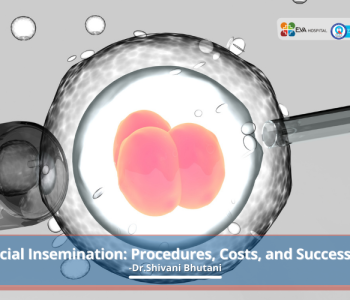 Eva Hospital
Eva Hospital
Artificial Insemination: Procedures, Costs, and Success Rates
Introduction
A method to deliver sperm into a woman’s cervix or uterus, in hope of her getting pregnant without sexual intercourse, is called Artificial Insemination.
It can be done with donor sperm or the intended father’s sperm. Occasionally, these sperm are washed to increase the chances of pregnancy.
Two of the approaches to AI methods are intrauterine insemination (IUI) and intracervical insemination (ICI).
Some women may also be prescribed medications for the stimulation of ovarian follicle growth and increasing conception chances.
Who Gets Artificial Insemination?
Women who have been struggling with infertility, or the inability to conceive despite having regular unprotected sex for over 6 months, may opt for Artificial Insemination.
This method can fight male infertility which stems from inadequate sperm count, motility, or maneuverability.
It is also a treatment for female infertility which may be caused by thick cervical mucus, endometriosis, or abnormal reproductive organs.
Single women who want their own children or those in same-sex relationships may also sometimes opt for artificial insemination using donor sperm.
Scheduling Artificial Insemination
Artificial insemination is scheduled based on a woman’s menstrual cycle. The chances of success are best if correlated with the time of ovulation ie the ovary releasing a mature egg about 14 days before the monthly period.
Ovulation can be determined by the woman with a calendar method or at-home ovulation test kits, as well as blood and urine tests or ultrasound at the doctor’s office.
Artificial insemination is usually tried once per menstrual cycle.
Sometimes, medications are prescribed to induce ovulation and increase the likelihood that a woman will release multiple eggs.
Intrauterine Insemination (IUI)
Intrauterine insemination (IUI) is a method mostly opted for male factor infertility. Otherwise, it is the commonly used method to fight unknown causes of infertility and endometriosis-induced infertility.
Women with thick cervical mucus that inhibits the sperm from reaching an egg may also get IUI.
This procedure is conducted in a doctor’s office. It involves inserting sperm past the cervix and directly into the uterus.
At the beginning of the IUI process, the intended mother is prescribed medications to elevate fertility.
A semen sample is prepared by the doctor either from the intended father or a donor, by separating the sperm from the seminal fluid as the seminal fluid can cause intense uterine contractions in women.
The sperm is then mixed with liquid, loaded onto a catheter, and inserted inside the vagina.
As the catheter reaches the uterus, doctors dispense the sperm inside. The process is similar to a Pap Smear.
As the sperm is inserted directly into the uterine cavity, it needs to travel less distance to reach the egg thus there’s a higher chance of conception than with normal intercourse.
Intracervical Insemination (ICI)
Intracervical Insemination is a simpler artificial insemination method that imitates natural intercourse. This is a process that involves inserting sperm into the cervix.
A syringe specially designed for ICI is loaded with unwashed, liquified semen from either a donor or the intended father.
This is inserted inside of the vagina and slowly emptied near the cervix. A woman needs to lie on her back during and for half an hour after the procedure. In case everything goes well the sperm travels to the fallopian tubes and forms a pregnancy.
There is another option where the sperm is placed in a cervical cap that is inserted into the cervix & stays for a designated amount of time.
This method can be used in a doctor’s office or sometimes even at home.
Success Rate
The success of artificial insemination depends on the following factors
- Woman’s age
- Use of fertility medications
- Underlying fertility concerns
The success rate for the IUI based on various researches are:
- 8-10% success rate for male-factor infertility
- 5% success rate for tubal infertility
- 18-20% success rate for unexplained infertility
The pregnancy rate for ICI is 37.9 percent after six treatment cycles.
Artificial Insemination Cost
The cost of Artificial Insemination depends on various factors like if donor sperm is being used, blood work, ultrasounds, and medications, etc
You can contact Dr. Shivani Bhutani, an infertility expert at Eva Hospital for information on this treatment and to know the cost and procedures.
Dr. Shivani Bhutani with her vast experience has been helping fill the life of couples having fertility issues, with the cheerful presence of their progeny.